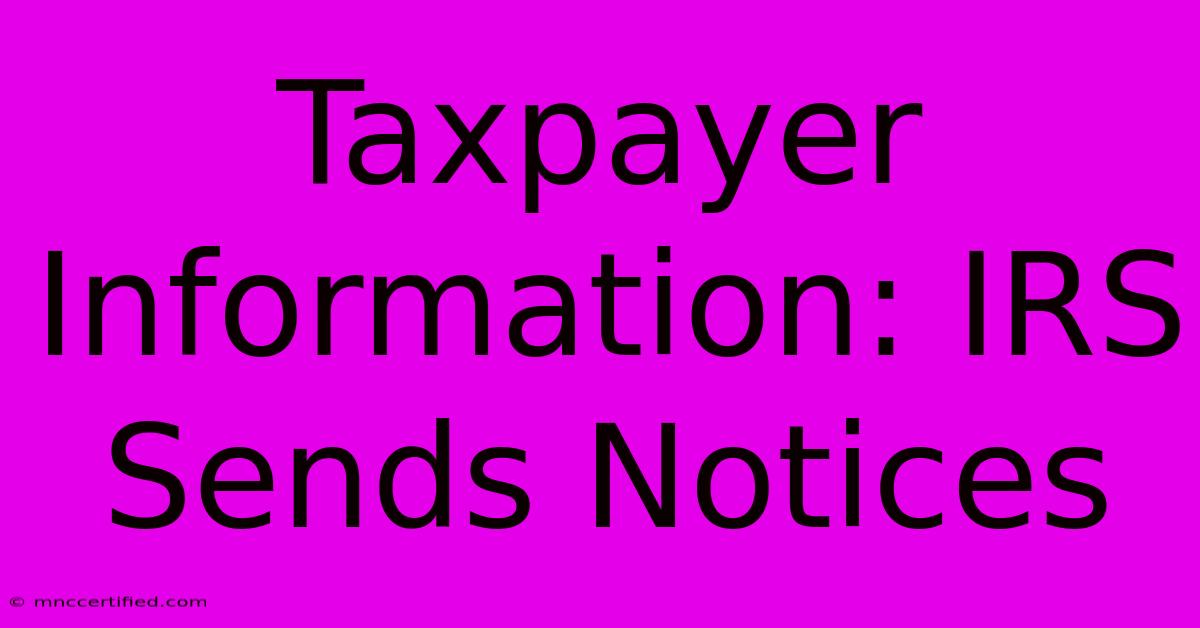Taxpayer Information: IRS Sends Notices

Table of Contents
Taxpayer Information: Understanding IRS Notices
Receiving a notice from the Internal Revenue Service (IRS) can be unsettling. This comprehensive guide will help you understand what these notices mean, how to respond, and what actions you should take. We'll cover various types of IRS notices, common reasons for receiving them, and strategies for resolving any issues promptly and effectively.
Understanding IRS Notices: Types and Meanings
The IRS uses different notice letters to communicate with taxpayers. These notices often have specific codes that indicate the reason for contact. Don't ignore these notices! Failing to respond can lead to penalties and further complications. Here are some common types:
CP Notices: Commonly Issued Notices
- CP2000: This notice is for mathematical errors on your tax return. The IRS has recalculated your tax liability, and you may owe additional taxes or receive a refund.
- CP14: This notice informs you of a change to your tax refund or balance due.
- CP501: This indicates a discrepancy in payments made, such as missing or mismatched payments. It might require additional information or documentation to verify your payments.
- CP702: The CP702 notice is for those who have outstanding or unpaid tax debts.
Other Important IRS Notices
- CP2100: This notice relates to a balance due on previously filed amended tax returns.
- CP503: Indicates a problem with your tax return information, such as inconsistencies or missing information. You will need to contact the IRS directly to clear this up.
- CP504: This involves the IRS's efforts to find out where to send a refund, usually when there's an issue with the address on file.
- Notice of Deficiency: This is a serious notice indicating a proposed tax change. It gives you a specific time frame to appeal the assessment. Seek professional tax advice immediately if you receive this notice.
How to Respond to an IRS Notice
Responding correctly and promptly to an IRS notice is critical. Here's a step-by-step guide:
- Read the Notice Carefully: Understand the specific issue the IRS is addressing. Note any deadlines and required actions.
- Gather Necessary Documents: Collect all relevant tax documents, such as W-2s, 1099s, receipts, and any supporting evidence.
- Verify the Information: Double-check the information on the notice against your own records. If there are errors, document them carefully.
- Respond within the Deadline: Adhere strictly to the response deadline stated in the notice. Late responses can lead to penalties.
- Contact the IRS if Needed: If you have questions or need clarification, contact the IRS using the phone number or address provided in the notice. Be prepared to provide your taxpayer identification number (TIN) and the notice number.
- Consider Professional Help: For complex notices or significant tax issues, seeking professional help from a tax advisor or accountant is recommended.
Preventing IRS Notices: Proactive Tax Strategies
Proactive tax planning can significantly reduce the risk of receiving IRS notices. Here are some key strategies:
- Accurate Record Keeping: Maintain meticulous records of all income, expenses, and tax-related documents. Organize your records efficiently for easy access.
- File on Time: File your tax return by the deadline to avoid penalties. Use tax preparation software or hire a tax professional to ensure accuracy.
- Pay on Time: Make timely tax payments to avoid penalties and interest charges. Set up automatic payments if possible.
- Regular Tax Reviews: Periodically review your tax situation to identify potential issues and adjust your tax strategies as needed.
Keywords: IRS Notice, CP2000, CP14, CP501, CP702, Taxpayer Information, IRS Communication, Tax Notice Response, Tax Problem Resolution, IRS Tax Debt, Amended Tax Return, Tax Refund Issue, Tax Payment Discrepancy.
Disclaimer: This information is for general guidance only and does not constitute professional tax advice. Consult with a qualified tax professional for advice tailored to your specific situation.

Thank you for visiting our website wich cover about Taxpayer Information: IRS Sends Notices. We hope the information provided has been useful to you. Feel free to contact us if you have any questions or need further assistance. See you next time and dont miss to bookmark.
Featured Posts
-
Cat Dies Northwest Naturals Recall
Dec 28, 2024
-
Connections December 28 Puzzle 566 Hints
Dec 28, 2024
-
Boxing Champ Dies After Win Paul Fight Linked
Dec 28, 2024
-
Update Fabianski Conscious
Dec 28, 2024
-
Nyt Connections Sports December 28 Answers
Dec 28, 2024